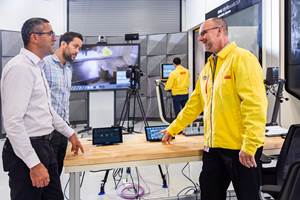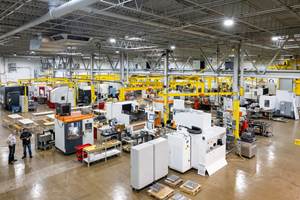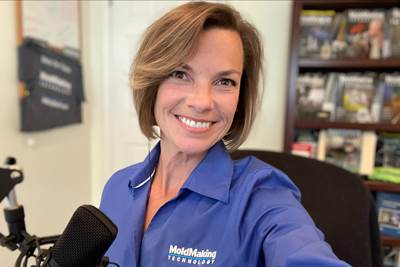“Using one word, how would you describe a great leader?” Leadership Coach and Author, Matt Lesser asked the room full of young professionals. “Passionate”, “Supportive”, the room began to buzz with different adjectives that come to mind when it comes to leadership. I chimed in with, “communicative”, something I value in all my relationships both personal and professional. It was a simple enough exercise that got the room thinking, What truly makes a great leader?
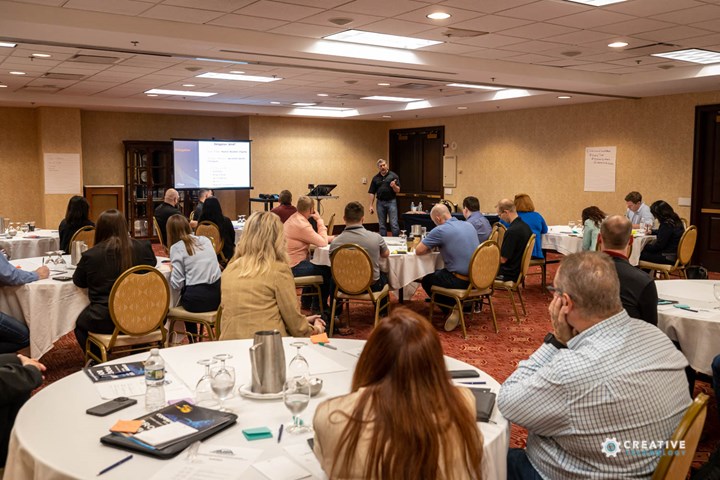
Matt Lesser speaks to young professionals at The Emerging Leaders AMBA pre-conference session. Photo Credit: Creative Technology Corp.
There are many qualities that can be attributed to an effective leader. Yes, there are people who seemingly are natural-born leaders, but the fact of the matter is, great leaders need to be cultivated. Matt Lesser’s session was great at giving a tool kit for anyone either moving into a position of leadership or someone who has been in a leadership position for years. My favorite part about the session was that he brought up qualities of an effective leader that are not always discussed.
Here are a three interesting and unique takeaways from Matt Lesser’s session:
1. The importance of delegation
It can be a common misconception that the role of a leader is to do it all. On the contrary, it is important for a leader to be able to delegate and assign responsibility where they see fit. I know in my own career I have had moments where I saw each project as a challenge to do myself. The reality was that if I had taught someone else how to do it, I would have helped myself as well as a colleague learn the skill of shared responsibility and teamwork.
2. Speaking of teamwork …
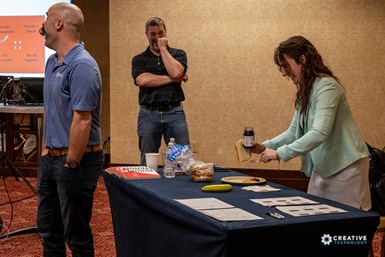
MMT Digital Editor, Cara Decknadel and United Tool and Mold’s Patrick Brisson build a sandwich during Matt Lesser’s leadership demonstration. Photo Credit: Creative Technologies
In his session, Lesser presented two demonstrations. One demonstration included two people making a sandwich. One person gave directions while the other made the sandwich, following the literal directions of the person delegating with no improvising. Easy enough, right? The catch was, the one giving instructions had their back turned to the person building the sandwich, creating a communication barrier and lack of knowledge of how the “sandwich” was being made.
The second demonstration was the same setup: one person gave directions while the other built the sandwich. This time, the person giving directions was allowed to watch the sandwich maker build the sandwich and therefore could add additional instruction where needed. The message was, a leader who is not involved in the project they are managing is bound to see a project completed ineffectively whereas a leader who is involved with the said project will see it completed correctly and efficiently. It is not enough to delegate a task and walk away, you have to see that delegation through.
3. “You can do anything for a season, be sure that season is not an endless winter.”
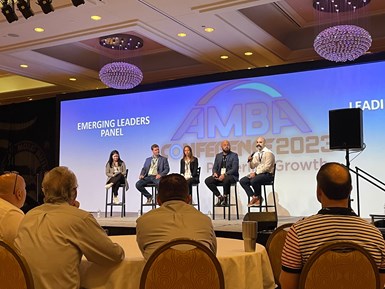
The Emerging Leaders panel at The AMBA Conference.
Photo Credit: MoldMaking Technology
I feel the future generations are slowly beginning to get a good grasp of work/life balance. While not always easy to put into practice, it is essential. I was both happy and relieved Matt Lesser brought this up during his Emerging Leaders session. A happy leader is a great leader, therefore it is important to not exhaust yourself by getting too engrossed in your work. Take breaks, spend time with family and make time for yourself and your hobbies. If you don’t have a hobby, take AMBA Emerging Leaders panelist Patrick Brisson’s advice and take your car to the car wash. According to Patrick, it is a great way to get a few minutes alone and clear your head.
Not only did Lesser give great examples of effective leadership strategy, he made being a leader seem tangible. I lived a good portion of my life believing leaders were born, not made and even went into the Emerging Leaders session feeling as though I didn’t belong there. But I left the session with a newfound confidence. With the right toolkit, anyone can learn to be a leader.
For more about Matt Lesser and to purchase his book, “UnSatisfied: When Less Is More” visit his LinkedIn.
Check out this slideshow wrap-up of the AMBA Conference 2023:
Related Content
Confronting the Mold Design Talent Drought
Recently, I reposted on LinkedIn the results of an informal survey we conducted, which revealed a shortage of skilled mold designers. It quickly gained a lot of traction. Given the response, I thought I'd summarize the feedback and keep the conversation going.
Read MoreHow to Use Continuing Education to Remain Competitive in Moldmaking
Continued training helps moldmakers make tooling decisions and properly use the latest cutting tool to efficiently machine high-quality molds.
Read MoreMMT Chats: The Science of Moldmaking, Part 2
In Part 2 of this two-part MMT Chat, Christina and Don continue their conversation by exploring lean manufacturing and tips on how to attract, train and retain the future workforce.
Read MoreCross Training, In-House Capabilities and Collaborative Design Move Helm Tool Forward
Cross-training, bringing it all in-house, molding and collaborative design are essential to Helm Tool's success.
Read MoreRead Next
Let Go! Leverage Your Mindset, Elevate Yourself as a Leader, Drive Organizational Purpose
AMBA Conference 2023 motivates me (and moldmakers) to let go of traditional mindsets to move (the industry) forward.
Read MoreMoldMaking Technology Recognizes its 2021 30 Under 30 Honorees
This year’s campaign garnered more than 30 next-generation moldmaking professionals who are making a difference in the mold manufacturing marketplace. We recognize all of them.
Read MoreUnique Mold Design Apprenticeship Using Untapped Resources
To help fill his mold design skills gap, Jeff Mertz of Anova Innovations, is focused on high schools and underprivileged school districts, a school that has lower graduation and college entrance rates. The goal is a student-run enterprise.
Read More

















